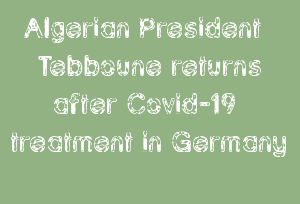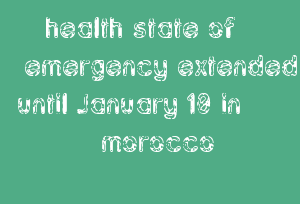profile/239120190910_105059.jpg
Benbruce

Algerian President Tebboune Returns After Covid-19 Treatment In Germany
~2.1 mins read
Algerian President Abdelmadjid Tebboune returned Tuesday after a two-month stay in Germany, where he was treated with Covid-19, ending a long period of uncertainty in a country facing a health, political and economic crisis.
Tebboune landed 6 pm local time in Algiers and was met with several senior government officials like the Prime Minister Abdelaziz Djerad and Army Chief of Staff General Said Chengriha.
"It's difficult to be far from my country and even more difficult for someone who has a lot of responsibility", said the head of state.
The Prime Minister said he was "happy to see the President of the Republic back to his homeland" and was eager to continue their agenda to achieve the objectives of the new Algeria.
Tebboune sel-isolated on 24 October following a positive coronavirus case among his close staff. He later tested positive and was flown to Germany on 28 October for treatment.
profile/239120190910_105059.jpg
Benbruce

Health State Of Emergency Extended Until January 10 In Morocco
~3.4 mins read
As part of ongoing efforts to limit the spread of coronavirus disease (COVID-19), authorities in Morocco have extended the nation's health state of emergency (SoE) until Jan. 10, 2021; the measure was previously in effect through Dec. 10. The SoE grants the government authority to impose swift and proactive measures, such as curfews and travel restrictions.
Authorities have extended existing restrictions in the Casablanca-Setatt region, as well as in the provinces of Mediouna and Nouaceur through at least Dec. 22. The partial lockdown and 2100-0600 nightly curfew remain in effect in the Casablanca-Settat region. Only individuals with authorization are allowed to enter or leave the region while restrictions are in place. Authorities have closed stadiums and parks. Cafes and restaurants must close at 2000 daily. Public transport is allowed to operate until 2100. Similar measures were implemented in Mediouna and Nouaceur provinces.
Several other cities and provinces have implemented increased restrictions, including:
An indefinite nightly 2100-0600 curfew is in force in Al Hoceima Province due to a rise in the number of COVID-19 cases. Restaurants and cafes must close by 2100 daily. Public gatherings are limited to 10 people and public parks, playgrounds, and sports stadiums are closed.
In the city of Tetouan, a nightly 2200-0500 curfew remains in effect; parks, playgrounds, and entertainment spaces are closed. Gatherings of more than 10 people are banned and markets must close by 1700 daily. Authorities have not said how long the restrictions will remain in place.
Officials periodically reimpose restrictions in cities across Morocco due to local rises in disease activity. Restrictions may include bans on all public gatherings, closures of beaches and public spaces, such as gardens and sports centers, and business closures, among other measures.
For disease monitoring and tracking purposes, the Moroccan government has classified certain areas in the country as "Zone-1" or "Zone-2" regions based on the local level of COVID-19 activity. In Zone-1 regions, authorities have eased restrictions due to lower disease activity. Residents can leave their homes without special permits but must carry their national identity cards at all times. Certain commercial establishments, such as restaurants, cafes, hotels, beaches, and public baths, are allowed to reopen; all businesses must operate at 50-percent capacity and comply with the country's social distancing guidelines. Zone-2 areas are those where authorities have eased only some restrictions; individuals may not travel outside their municipality of residence without a special permit.
Generally, nationwide some businesses and services, including hotels, intercity transport, and restaurants, have reopened, albeit under certain operating capacity limitations. Authorities also allow gatherings of more than 20 people in most regions; however, weddings, funerals, movie theaters, and public swimming pools remain banned or closed until further notice. Domestic flights and public transport, including train and bus services, are in operation.
International passenger flights remain suspended until further notice; however, some airlines operate limited repatriation and charter flights. Emergency and cargo flights are exempt. Sea travel to Spain, Gibraltar, and France remains suspended. The border with the Spanish autonomous cities of Ceuta and Melilla, located on the northern coast of Africa, is closed until further notice.
Nevertheless, the country's borders are open to authorized business visitors, such as those persons with an invitation from a Moroccan company to travel to the country with confirmed hotel reservations. The invitation from a Moroccan company must include the traveler's full name and passport number, the purpose of the visit, and the length of stay in the country. Royal Air Maroc (AT) has announced that it will accommodate and allow foreigners who meet the government's requirements to fly with the airline.
Authorities could further ease restrictions or introduce additional preventative measures, depending on the evolution of disease activity in the coming days and weeks.
Advertisement

Link socials
Matches
Loading...
